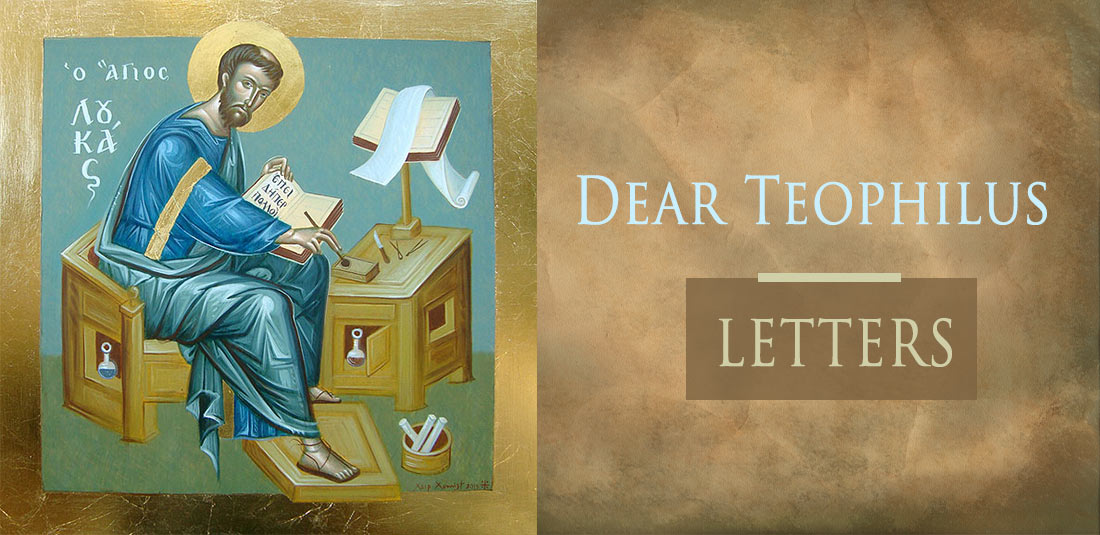Dear Theophilus , (Letter 71. )
I want to continue our discussion from the last letter.
In the last letter I described a little bit how we have been seduced by the worship of our own power over nature through technology. Ironically, our conquest of nature results in our subduing and controlling the rest of humanity as things such as morality and love find no place in this world-view.
Over many centuries, it was Christianity which informed and guided our approach to nature and to our neighbor. This was an extraordinary irruption into the world of a view centred on the centrality of charity which was the dominant value. But it seems that this view is now fading and being relegated to a distant past with no impact on today’s society, irrespective of the lip service paid to Christian values. Only lip service is paid to the values of previous ages, values that are seen as outmoded and irrelevant.
But just as there is a dark side to science, there is also a dark side to some interpretations of “christianity” and what it teaches. And this is something I want to address now. Many, down the centuries, were saddled with the notion that all humans, at conception, are tainted with guilt of a transgression, not of their own making, that condemned them to eternal separation from God. This idea of inherited guilt is an absurdity but it was tenaciously hung onto in many circles.
Another segment of “christianity” condemned the vast majority of humanity to perpetual torment, including children who died unbaptized. In the Augustinian tradition, people merit eternal damnation and suffering as only a select few are deemed worthy of salvation. Augustine went so far as to lament the soft-heartedness of Origen who held out the hope that demons, heathens and even unbaptized children might ultimately be spared from eternal suffering. This concern, that those who are unbaptized will be consigned to eternal suffering, of course, led to a frenzied effort to baptize as many as possible.
Calvin taught that divine sovereignty necessitates belief in predestination of those who are saved and those who are damned. And he explained away the statement that God is love by the qualifier that God is experienced as love only by those who are saved but by those who are damned, He is experienced as hate and torment. Eternal hell was seen as a way to secure God’s sovereignty and unlimited power.
These ideas may seem like exceptions but they were part of mainstream thinking. Tertullian, one of the early Church’s Fathers, speaks of the saved relishing the delightful spectacle of the suffering of the damned. Peter Lombard and Thomas Aquinas state that the vision of the suffering of the damned will increase the beatitude of the redeemed, and I could go on and on with many more examples.
And even today, there are echoes of the need for a hell of eternal torment in order to respect creaturely freedom and God’s sovereignty and dignity. It is this reference to creaturely freedom that leads to the claims for a need for a hell of eternal suffering and gives rise to the absurdities that I have briefly listed above. But let’s take a closer look at this free will defence for the need for a hell.
Free will has certain characteristics: it has a purpose in mind, it has a goal it wants to achieve, and it is oriented to the Good. No one can will evil as such, but will dress it up in appearance of the Good. In other words, no one can will evil as evil per se. As someone once said, evil is just love that has been corrupted as to goals or means – in a sense, it is a twisted Good.
To know the Good is to truly desire it and therefore one who is free, will desire the Good. If one does not, then one is not free to choose the Good. “Father, forgive them, for they know not what they do” says God to God on the cross. Those who crucified Christ did not freely choose to do evil and must therefore, be forgiven – they are really not responsible for their choices. Under normal conditions, even we, will not hold accountable those who are mad, who have lost their free will.
And consider the conditions under which each soul enters the world and faces the vagaries the world throws at them. Think of all possible chance occurrences of ignorance, intellect, fortune, place of birth, health and how all of these can impact on the path that a person will take in their lives. And in spite of all this, it is claimed that the eternal fate of a person is determined, basing itself on those chance occurrences, conferring the possibility of eternal suffering or salvation. This is really unfair and portrays god as some manipulative bully playing with people’s lives for eternity. Is it any wonder that so many have turned away from this ‘god’ and have embraced atheism? But is this a really accurate picture of the God depicted in the Scriptures?
The existence of hell is a very serious obstacle to those who would like to believe but cannot because of the inherent unfairness of the idea that human beings can be lost forever and thereby, God’s plans can be thwarted. What are we to make of this? We could propose abandoning the teaching about the existence of hell, but there seems to be so much evidence for this concept in Scripture that this is not a viable alternative. But there is another side to the question of an eternal hell and that possibility looks at the duration of suffering.
It is commonplace to speak of suffering in hell as extending for an eternity. The matter, however is not that simple. The Greek term supposedly used to denote eternal punishment in the New Testament has several possible translations. The phrase aionios kolasis is typically translated eternal punishment but it can also be read as ‘correction for a long period’, or ‘for an age’ or even ‘in the age to come’. Thus, important Church Fathers such as Origen, Gregory of Nazianzus, Gregory of Nyssa and Isaac of Ninevah saw no reason to conclude that hell was anything but a temporary process of purification.
Having said this, it cannot be denied that the idea of eternal suffering was quite widespread in the early Church. But the source for this may not be only scriptural but the impact of the society within which Christians lived. And it is undeniable, that the idea of eternal suffering pre-dates Christianity and this may have entered into the beliefs and views of early Christians.
When considering scriptural references, it is dangerous to be selective but one must look at what Scriptures are saying overall. It is quite clear that there are many references to the fact that what God’s aim is, is to save every human being because each person is created by God and is loved by God.
Let me just give you a few scriptural references so that we can get a fuller picture on this question of an eternal hell and suffering.
Roman 5:18; “Therefore, as through one man’s offence judgement came to all men, resulting in condemnation, even so through one Man’s righteous act the free gift came to all men, resulting in justification of life.”
Romans 11:32; “For God has committed them all to disobedience, that He might have mercy on all.”
1 Corinthians 3:15; “If anyone’s work is burned, he will suffer loss; but he himself will be saved.”
1 Corinthians 15:28; “…..that God may be all in all.”
1 Timothy 2:3-4; “For this is good and acceptable in the sight of God our Savior, who desires all men to be saved and to come to the knowledge of the truth.”
1 Timothy 4:10; “….we trust in the living God, who is the Savior of all men.”
There are many other references that can be given but I will comment on the ones I have given more fully in the next letter. In summary, what this letter underlines is that an indiscriminate, and sometimes exaggerated, teaching about eternal damnation has done much damage It has led to statements that any sensitive person would object to. There are important lessons here – we have no right to simply say that it doesn’t matter what we do – everything will be right and there will be no cost to us. But at the same time, we should be careful not to make claims that will not stand up to a wider consideration of scriptures. And we must consider what scriptures say in a wider context than a simple selective sampling of a few quotations. It is to Scriptures that we must turn in order to determine what it is that our faith is really teaching, especially about this contentious item of an eternal hell. But, more in the next letter.
Sincerely, Bar-Abbas






